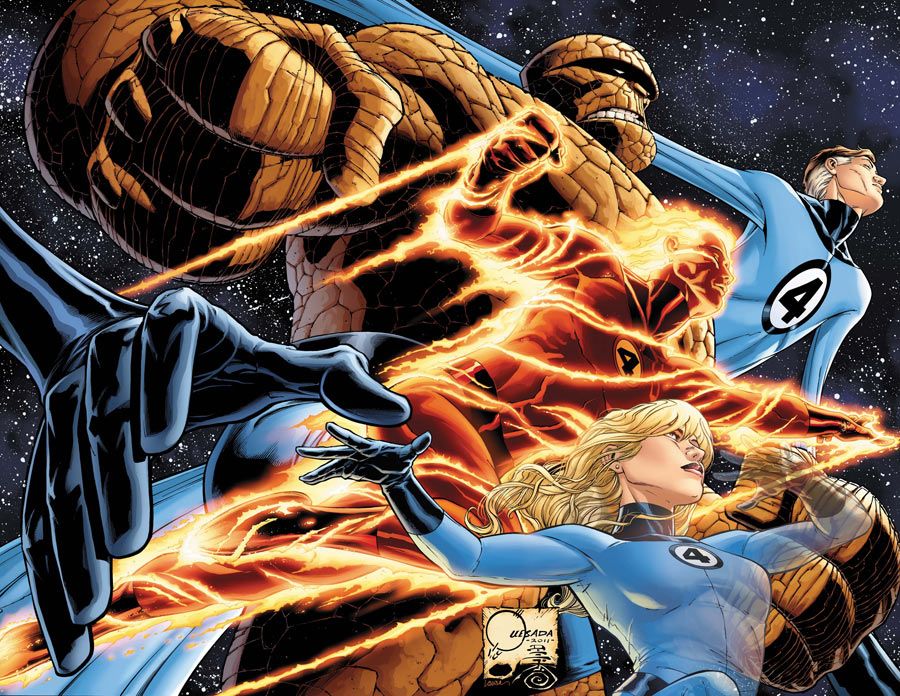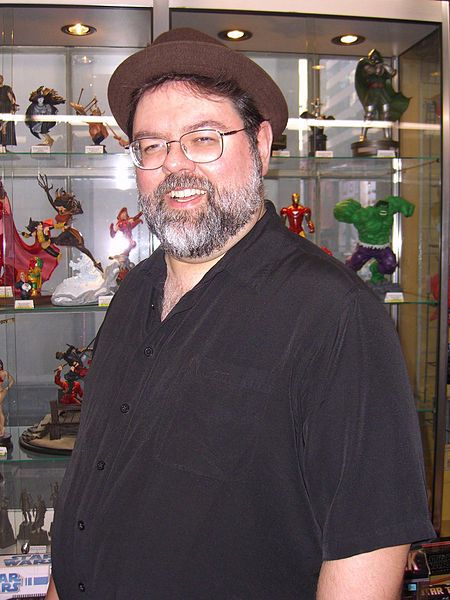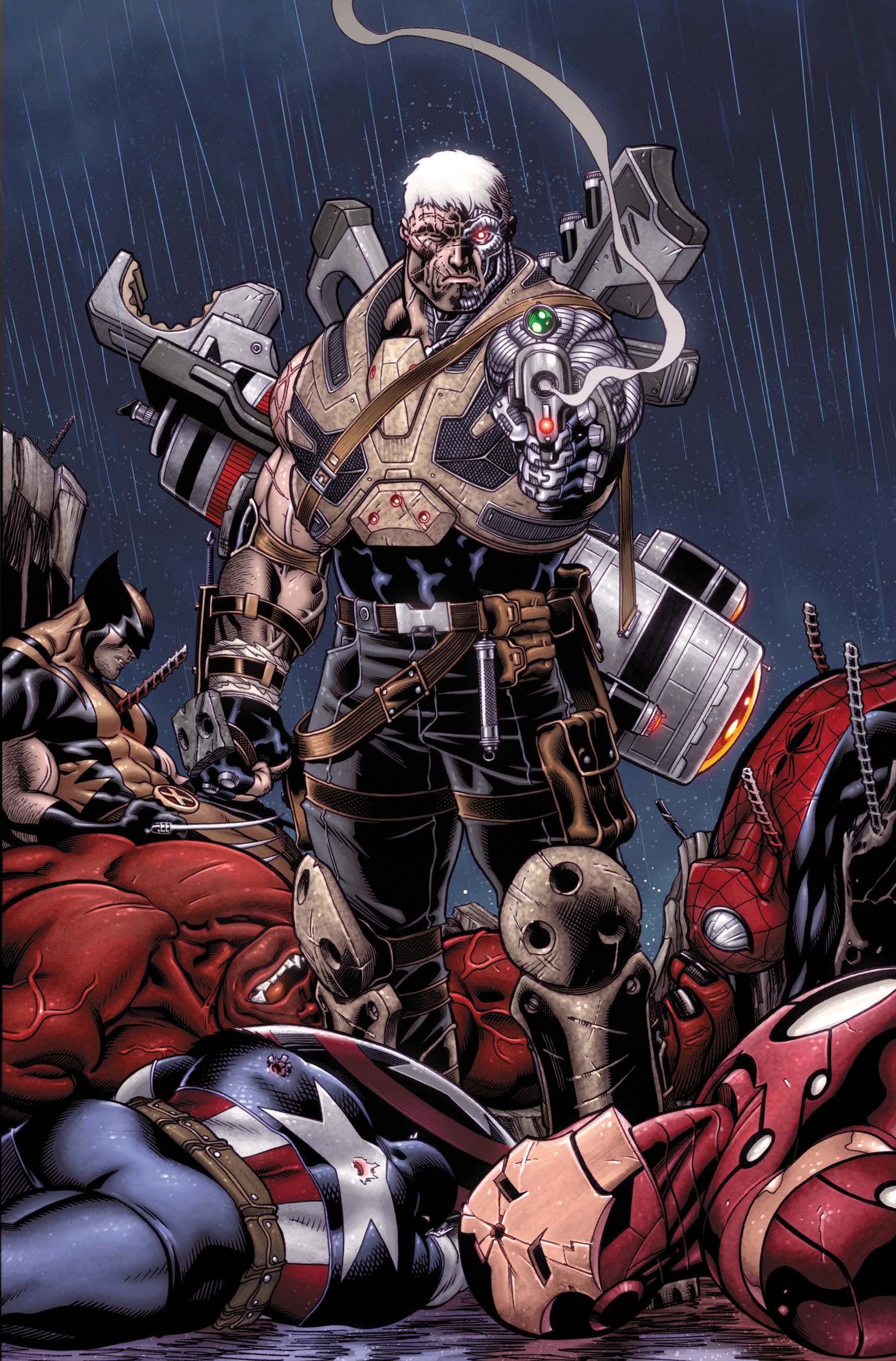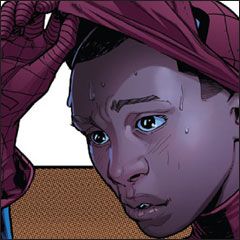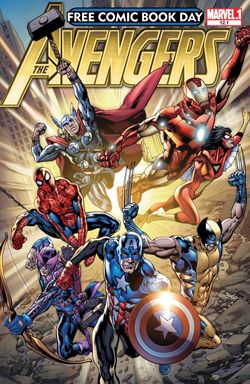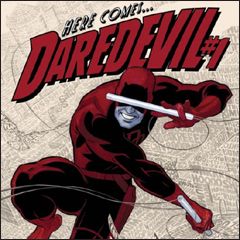Let's not mince words, the online presence of Tom Brevoort has provided hours of great reading for Robot 6 readers. Given his constant and unflagging willingness to interact with consumers via social media, Brevoort is a quote machine (His Twitter bio? "A man constantly on the verge of saying something stupid--for your entertainment!?"). There's always a directness (some would say bluntness) to his manner online--making him the ideal subject for an interview. Last year saw Marvel promote Brevoort to senior vice president for publishing. 2011 was a year of some major successes for Marvel, as well as a year where some hard business decisions were made. In this interview, conducted in mid-December via email, I tried to cover a great deal of ground (we even briefly discuss DC's New 52 success)--and Brevoort did not hold back on any of his answers. For that, I am extremely grateful. Like any high profile comics executive, Brevoort has his fans and his critics (and many in between), but I like to think this exchange offers some perspectives everyone can enjoy.
Tim O'Shea: Whether it’s in your job description or not, fan outreach via social media is definitely part of your job--clearly by your own choice. What benefit or enjoyment do you get from interacting with the fans/consumers?
Tom Brevoort: I’m not sure that I get a particular benefit, except maybe just being the center of attention for a few minutes—maybe everything I do is motivated by ego! I’m a whore for the spotlight! But I started doing this kind of outreach back in the formative days of internet fandom, largely because I like the idea of internet fandom. I know that, if the internet had existed when I was a young comic book reader, I’d have been on those message boards and in those chat rooms all the time, obsessively—just like a certain portion of the audience today. So I like the idea of giving back, of being accessible enough that anybody who has a question or a concern knows where to find me, or at least to find somebody with an insider’s track who might have the background and knowledge to speak to their point. In a very real way, it’s all an outgrowth of what Stan Lee did in his letters pages and Bullpen pages. Joe Q, I think, was really the first person to perfect that approach for the internet age. As EIC he was incredibly available to the audience in a myriad of ways. It’s a philosophy that’s very much woven into our DNA at Marvel. And for the most part, our fans are interesting, vibrant, cool people, especially when you meet them in person.
O'Shea: Much has been made of the miniseries cancelled in mid-arc, or announced projects killed, but I am curious to learn how it impacts you to see co-workers being let go in the recent round of belt tightening? When I ask this I don’t necessarily mean on a personal level, per se, but rather in terms of the loss to Marvel's collective creative/editorial talent, how challenging is it to deliver the best product Marvel can produce when you lose some talented editors?
Brevoort: It’s terrific, I love seeing people let go into one of the worst job markets in recent memory! I’m sorry, Tim, but I don’t think it’s possible to answer this question in anything other than a personal way—or if it is, I’m just not that dispassionate about it. I certainly understand that a business is a business, but there’s also a very human face on all of this. The people who were let go were my co-workers and friends, none of them were dismissed for cause, they’re all great, talented people. But that’s the economic world we find ourselves in right now, and as somebody who has to keep an eye on the business as a business, I understand and accept that. And it definitely means that those of us that remain have to work harder to do the same thing—that’s just simple mathematics. An editor who was once dealing with six projects maybe now has to cope with seven, or eight, at least until we’re through the backlog of material that was initially in the hands of those editors no longer on staff. So it’s definitely a lot to ask—but we’ve got the best crew in the business at Marvel, and though we may all grumble from time to time, everybody steps up to get the job not only done but done with the greatest level of excellence that can be managed. It really is an extraordinary group of dedicated people. And, on the flipside, there’s now some editorial talent out in the marketplace with super-strong skills that any other company could benefit enormously from. So a word to the wise there.
O'Shea: When 2011 began, could you ever have envisioned Marvel having cancelled a miniseries before it even finished?
Brevoort: It’s an unfortunate thing, but yes, I could. I’ve seen it happen in the past, though not quite in the way it happened on All-Winners. And some of that is my doing. We could have gone in at the last minute and tried to hack up the climax of the story, bringing things to a truncated resolution in issue #5. But with three whole issues left to go, I didn’t want to do that. Admittedly, that would have given the readers some kind of resolution, but it would have been a bad and unsatisfying reading experience. So I made the argument that, with so much story still left to tell, we should simply stop. That way, if market conditions improved down the line, and there was enough sustained interest in the project, we might eventually be able to return to it and finish it properly in the future. Hey, the last issue of Ghost Rider that I edited saw print ten years after it was created, so anything’s possible. I’m also a child of the 70s, where books would often be cancelled mid-stream, with no warning and no resolution, so I may be more immunized to this happening than a lot of other people, because I’ve seen it happen before. It stinks, nobody likes it, but again, that’s the marketplace in which we seem to find ourselves. The one thing I know for certain is that putting out issues that lose money is a good way to get to the point where you can’t put out any issues at all.
O'Shea: At the beginning of 2011, you assumed your senior VP role. With almost a year under your belt, I am curious what have you most enjoyed about your increased responsibilities? With your increased executive duties, is there an aspect of your pre-2011 responsibilities that you wish you still had time to do?
Brevoort: People, I think, get dazzled by the title, which maybe sounds like a lot more than what it actually entails. I’m still very much doing all of the things I was doing last year, just with a bit more stuff added on top of it. I’m maybe looking at the whole line more, rather than just half of the line. But I’m still directly editing a good number of books—Avengers, New Avengers, Secret Avengers, Fantastic Four, FF, Captain America, Children’s Crusade, X-Sanction, Defenders at least for the first two issues, and a lot more. So there isn’t a whole lot of down time, and there are definitely days when I feel like I could use another me to handle all of the stuff that’s stacked up while I was on the phone talking to a creator or off in a planning meeting of some kind.
O'Shea: While clearly a main focus of 2011 was Fear Itself, what were the other main successes of the past year?
Brevoort: I think we had a bunch of successes this year, and I’m probably going to forget all kinds of things as I run down the list. But certainly the death of the Human Torch and the rebranding of Fantastic Four as FF was a bigger success than we would have imagined. The Death of Ultimate Spider-Man and the introduction of Miles Morales. The “Spider-Island” crossover and just Amazing Spider-Man in general, a series that not only has been garnering all kinds of good fan reaction but has also consistently come out twice a month. Schism, and even more so the relaunching of the core X-titles as Uncanny X-Men and Wolverine & The X-Men. Waid, Rivera and Martin’s Daredevil, probably the best-reviewed title we’ve got right now, Remender and Co’s Uncanny X-Force—I feel like our line is very strong overall right now, even though it’s easy for people to sometimes take that for granted. You take a book like, say, Fraction and Larroca’s Invincible Iron Man, and it comes out like clockwork 12-16 times a year, with the same creative team telling highly-polished stories. After a while, people start to overlook it because it’s so consistent. Also, the steady growth of our digital initiatives. That’s a world that’s going to become steadily more important to us, and to the business in general. We had a couple good movies, too.
O'Shea: In terms of "the steady growth of our digital initiatives," what kind of milestones or successes did Marvel see in the steady growth?
Brevoort: I don’t know that there are any specific milestones I can point you to, in that most of our data about the digital world is confidential. But especially in instances where we had mainstream coverage on a particular storyline—Miles Morales, say, or Fantastic Four #600—we saw a pronounced uptick in our digital sales, with each new one besting the sales records of the previous. And all without having a measurable impact on our tangible copy sales. I think that everybody has still only scratched the surface of digital as a delivery platform for the kinds of material that we do, and that it’s only likely to grow further into a cornerstone of our overall publishing business.
O'Shea: You don’t work for DC, but you clearly have an opinion about the other major industry publisher, so I have to ask: Did DC’s 52 perform beyond your expectations, or is their success (still potentially short term, only time will tell) along the lines of what one might expect from a major line relaunch?
Brevoort: I don’t think we have good enough optics yet to predict the long term—we’re only now heading into the period of time wherein retailers can return their unsold copies, so the numbers for those months aren’t finalized yet. But there’s no two ways about it, regardless of how many books they get back, DC did a great job of getting their message out to the world and getting excited readers new, lapsed and existing into the stores to check out what they had going on. I don’t know how, at least judged in those terms, it could have been any more of a success. And I’m very happy about it—not just because we’ve seen an uptick in our sales for those months as well, but because increased competition leads to more excitement and better books. A lot of people have maybe misunderstood my message over these months, and maybe that’s my fault for not getting it across as clearly as I might have. But my biggest complaint and concern for the longest time was that it often felt as though DC had given up the fight, that they were content to just drift along, doing business as usual and not making waves. And a marketplace that Marvel is half of or more isn’t healthy—it puts too much weight on one part of the machine, too much responsibility. So I couldn’t be happier that the new DC team is stepping up to the challenge and hitting the field ready and willing to play the game. And that’ll force us at Marvel to up our game as well. The question now, of course, will be whether and for how long they might be able to maintain that increased readership base.
O'Shea: You recently discussed Marvel’s plans for the 2012 Free Comic Book Day. In reading your Formspring discussion of FCBD, I was left wondering, what is the main goal/point of FCBD to you? And while you think FCBD is being served in 2012 by a reprint, for those who are disappointed, do you understand when they may strongly disagree when you characterize them as potentially “petty”?
Brevoort: Well, in fairness, I characterized a single question-asker’s question as possibly petty, not the audience as a whole. But as I understand it, Free Comic Book Day is an outreach program that enables local retailers across the country to mount the kind of mainstream promotion and local event that potentially draws new people into the stores. The existing fan base is served by it, sure, but it’s not really aimed at them, but at everybody who doesn’t regularly make the trek out to their local stores. So on that level, I want our FCBD entries to be entry-level friendly—not unsophisticated, but self-explanatory in terms of the story presented. And I want them produced at the highest level of quality possible. But I don’t know that there’s any pressing need for them to be all-new material. Certainly DC’s had no problem with running repurposed material in their FCBD entries the past couple of years. I mean, it’s great to be able to give people an all-new story by our best guys absolutely for free, but we’re talking about an economy in which we had to let a number of people go—it’s an expense that doesn’t recoup itself in any way, and one that isn’t even really necessary in terms of what the goal of the event is. So sure, I’m sorry that our regular readers will have to make do with “only” an Avengers comic written by Brian Bendis and drawn by Bryan Hitch that they may have purchased previously. But, y’know, this even isn’t really about you!
O'Shea: With the news of Brian Bendis of departing the Avengers franchise, after his long and very successful run, it got me wondering. When faced with the prospect of finding a new writer for a successful book like the Avengers, what kind of criteria do you use in your search?
Brevoort: Well, it’s different every time, in that you’re working with a completely different array of variable each time. But to paint the process in broad strokes, you need to assess where the series is at, what’s been strong and working and indispensable about it and what it might be lacking. In other words, and this is pretty obvious, you want to try to maintain the appeal that a book has under its current creative team and then build upon it by accentuating those areas or aspects that haven’t been explored as much. To point to a specific example and provide you some context, when Mark Millar and Bryan Hitch were finishing up their run on Fantastic Four, I needed to line up their successor. In looking at the series as a whole, having come off of JMS and Dwayne McDuffie before them, and Mark Waid and Mike Wieringo before that, I felt like the time was right to try to get a younger voice into the mix—the book had been done by apex talent for a long run, but Fantastic Four is a series that’s got a strong almost gravitic pull towards its past, those initial 100 issues are so seminal. So I wanted to bring in somebody who would have something new to say, and who maybe wouldn’t be as shackled in his thinking to the past. At the same time, I wanted to maintain the overall positive/optimistic flavor that the series has always had when it’s been really clicking, in my opinion. Given those parameters, it didn’t take me long to start speaking with Jonathan Hickman, with whom I was working on Secret Warriors at the time. Jonathan went away, pulled together his ideas, and came back with a strong pitch for the series—and away we went! So it’s very much the same kind of thing on Avengers. Brian is leaving behind a legacy that it’s going to be very difficult for somebody else to equal or surpass, but that’s the challenge of the incumbent. As it happens, I’ve already got the next Avengers writer lined up, though it’ll probably be several months before you all learn who it is—Brian’s still got about a year’s worth of great stories to tell before that switchover happens.
O'Shea: You tapped Hickman to write Fantastic Four partially because he was someone "who maybe wouldn’t be as shackled in his thinking to the past". Am I right in thinking you also do not mind tapping writers who can partially mine the past and find new story potential, given what a writer like Ed Brubaker has been able to do with James Bucky/Winter Soldier Barnes (as well as some elements of Hickman's work on Secret Warriors)?
Brevoort: Well, yes, sure. One of the strengths of the Marvel Universe is the conceit that it’s one vast, interconnected place in which all of these stories co-exist, going back to 1961 and beyond. So sometimes you want to take advantage of that fact. But you always need to keep the bigger picture in mind. There have been times in Marvel’s history when whole stories have been written to explain some gaffe in an earlier story—those tend to be “comics about comics” and only of interest to our most hardcore audience. The continuity and the history is meant to be there to service the stories, not the other way around. At times, people at Marvel have lost sight of that. But there’s no problem with mining the past of our characters and our publishing history, so long as the stories that you do with that material are genuine, and have some compelling emotional touch-point for a modern reader who may not have read the earlier stories your tale is based on. In other words, you can do Star Trek II: Wrath Of Khan, but like that film, you need to do so in such a way that an audience member can have a great experience even if they’ve never seen the earlier Star Trek episode that Khan was introduced in.
O'Shea: How do you avoid burnout in your demanding job--how and why are comics still fun for you?
Brevoort: I just love comics. I love the characters, I love the stories, and I love the form. And not just any one style of comics, but all sorts of comics. I still go to the comic store every week like clockwork and drop crazy money on assorted new releases. And while what I do isn’t always easy or always fun—it is a business, after all—I never lose sight of the fact that, in a very real sense, I get to sit around and make up stories about people that fly all day, and then they pay me for it. And that’s pretty great! I also get to collaborate with a broad spectrum of supremely talented people, from our assorted creators through our incredible editorial staff, our promotions guys, online, the film and television folks—just about everybody. So yes, the hours are long and the days can be grueling, and there are those times when things aren’t breaking the way you’d like them to or there’s some difficulty that has to be worked through. It’s a high-pressure situation, keeping this many trains on the tracks every month and getting to their destinations on time. But it’s also a considerable amount of fun. There’s never a better feeling than when the printed copy of an especially good issue comes into the office, and you get to look it over before anybody else.
O'Shea: The death and return of the Human Torch this year (and the saga that transpired along with it) has clearly resonated with readership. From your standpoint, what is it about series writer Jonathan Hickman's approach to Marvel’s First Family that enables him to click with readers?
Brevoort: I think that readers are only now starting to get a sense of what Jonathan’s been doing, not just on Fantastic Four but on all of his books, and that is to create long-form stories in which the individual parts all mesh together with mechanical precision to create a much greater whole and a much grander reading experience, one that truly rewards multiple rereadings. In a world of short attention spans, Jonathan is one of the few guys who comes onto a series with years’ worth of concepts, and he’s able to set things up in such a way that events past a certain point continue to build and build and build in a logical way, and then ultimately pay off great. Now that folks can look back at all of Secret Warriors as a whole, it’s easy to see just how much of the overall story Jonathan had in his head when the book began, and how even events in the first teaser short story we did in the Dark Reign: New Nation book fold back into the climax 28 issues and three years later. On Fantastic Four, I just gave him a sense of the kind of thing I was looking for and set him loose, and he came back with a gameplan that we’re only now, almost three years later, getting to the climax of. I think it was beneficial as well that Jonathan had never really been a Fantastic Four reader beforehand, in that he was able to come to the characters and the material fresh, to look over the entire history of the series and figure out for himself what he thought worked best about it without any personal nostalgia coloring his viewpoint. He clearly loves writing the kids, to the point where they would often threaten to take over the series.
O'Shea: This past year also saw Daredevil endure a great deal through Shadowland, as well as Daredevil: Reborn. But when all was said and done, the new Daredevil series by Mark Waid (along with Paola Rivera or Marcos Martin on art) is a major shift in tone that has been embraced by critics and fans equally. How satisfying is it to see Marvel take such a creative shift and pull it off so effectively?
Brevoort: It was a gamble to break with the past so severely in terms of the tone and the style of Daredevil, but it’s definitely a gamble that’s paid off big time. And that’s all thanks to the efforts not only of Mark, Paolo and Marcos, but especially those of editor Steve Wacker and his team. For my money, Steve is the solidest line editor in the business today. He’s great to work with, he’s got a strong point of view and a vision for what he does, he thinks about the whole package even beyond just the story and the artwork, and creators love working with him. And maybe it's just that his sensibilities and mine are similar, but his batting average in terms of the content of his titles has been tremendously good: Avenging Spider-Man, Daredevil, Punisher, Venom, Scarlet Spider—those last three are books that, by all rights, I shouldn’t be enjoying anywhere near as much as I do. And, of course, keeping the juggernaut that is Amazing Spider-Man on the rails and successful both commercially and critically for such a long period of time. Getting back to Daredevil, obviously Marcos Martin is a genius, and Paolo Rivera’s an incredible talent, but it’s especially nice to see somebody like Mark Waid gathering such kudos. Like we were talking about with Invincible Iron Man before, Mark’s been around the industry for so long and has such a track record for producing excellent work that I think it’s easy for people to overlook what he does; “Oh, it’s another good Mark Waid comics again. Yawn.” Whether it’s just ageism or familiarity breeding contempt or whatever, the fact remains that Mark’s been a power hitter of great consistency for two decades now—so it’s very nice to see him getting the sort of attention and praise often reserved for new hot young guys.
O'Shea: We have talked about some of the great writing of Marvel in the past year or so, and while we have briefly touched upon the greatness of Paola Rivera and Marcos Martin's work, I wonder if you'd like to discuss some of the other artists that really seemed to hit their stride in 2011 (and/or you look forward to knocking it out of the visual park in 2012)?
Brevoort: It’s truly an embarrassment of riches at Marvel in terms of artistic talent, so this is something I could go on about at length, and never run out of material. But focusing more on promising up-and-coming talent, there are three or four creators who seem to really be hitting a stride, beyond the ones we mentioned earlier. Sara Pichelli has been a revelation on Ultimate Spider-Man, her sense of environment and character acting is second to none. Nick Bradshaw harnesses the detail-craziness of an Art Adams around an appealing, bouncy, energetic penciling style. Jerome Opena is a terrific action artist, with a subtlety of line that I’m not sure entirely translates into ink. Ryan Stegman draws great , appealing characters with a lot of bounce, very much in the spirit of Joe Madureira or J Scott Campbell. And there are plenty of others, of course—but that’s a smattering of folks that come to mind this morning.
O'Shea: Looking ahead to 2012, if response is strong enough to the Marvel Season One books, would there be a possibility of pursuing an ongoing series with those creative teams, or is the focus solely on original graphic novels of the characters' origins?
Brevoort: I wouldn’t rule anything out—every option has been discussed, doing follow-up volumes (“Season Two”) or serialized follow-ups, and every other option in-between. But it’s all a moot question until we can see how people respond to the initial books. At this point, I’ve read the completed Fantastic Four Season One volume front to back, and it is outstanding! I couldn’t be more pleased with it—and I say that having had nothing particular to do with it. All of the credit goes to Roberto Sacasa, David Marquez, Lee Duhig and editor Lauren Sankovitch. These guys understood the mandate of the line and really delivered the goods, in a way that I think will be appreciated by fans old and new. The X-Men Season One book is similarly looking and reading well, based on the 40 or so pages I’ve gone over so far.
O'Shea: Any closing thoughts you’d like to leave Robot 6 readers with?
Brevoort: I think that my general message for comic book readers of all kinds right this moment would be: relax! It’s so easy to become overly anxious or overly outraged or overly agitated about all sorts of aspects of what we do, the characters we create and the worlds we build. And we love that sort of emotional investment! But keep in mind, these are just stories! It’s all just entertainment! If you’re being entertained, then everything is fine! And if you’re not, try something else! Try something new! Reading comics shouldn’t be a job, and neither should it be a series of existential crises on a month-by-month basis. Also (and I know that this isn’t something that most readers are going to be willing or able to do), stop being so concerned about what’s going to be happening three or six or nine months down the line and try to focus a little bit more on what’s going on right now! Don’t miss the precious moment in the anxiety about what tomorrow will bring! None of what we do is life-threatening, it’s not likely to change the world in any but the most subtle of ways—the drama need not be quite so overblown!
Also, it’d be nice to get into a blog entry headline from time to time for something other than saying something provocative.

